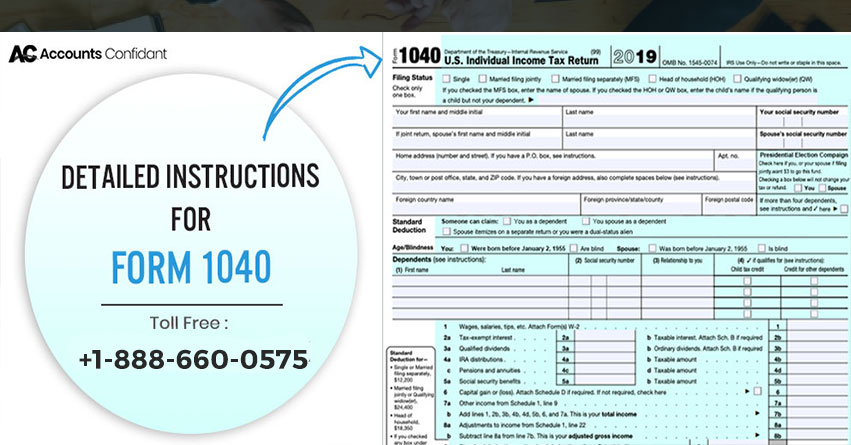The IRS Form 1040 is one of the most common IRS tax forms. U.S. taxpayers use this document to file their yearly income tax return, claim tax credits and tax deductions, and also calculate the total tax refund or tax bill for the financial year. The official name of this form is ‘U.S. Individual Income Tax Return’.
Earlier, the IRS had various variants of the Form 1040. From which taxpayers had to choose the correct one on their own to file the taxes. But now the IRS changed this in 2018. There is only one IRS 1040 Form now that is applicable to everyone who is filing taxes in the U.S. Those variants were IRS Form 1040A and 1040EZ. They are no longer used or required by the IRS for tax filing in 2019.
Now the form has 6 numbered schedules in addition to the base form. These additional schedules need to be filed too depending on the conditions that are applicable to you.
How to File IRS Form 1040?
On the first page of this form, your Adjusted Gross Income and Taxable income is calculated.
- In the first section, of the page, you need to enter information about all the applicable income sources.
- These income sources include your wages and salary, dividends, taxable state and local tax refunds, tips, interest, taxable alimony, business income, capital gains, farm income, unemployment income, SS (Social Security) benefits, etc.
- There will be a box on the form to list ‘other income’ received by you that doesn’t fit into any of the above-mentioned categories.
All income received by you must be reported regardless of where it comes from. You do not need to report it only if it is tax-exempt. The addition of all of these incomes is known as your total income.
Which Schedule Is Applicable in What Situation?
Schedule 1: This schedule is applicable if you have additional income like capital gains, prize money, unemployment compensation, etc. It is also applicable if you have any deductions to claim like student loan interest, educator expenses or self-employment tax.
Schedule 2: If you owe AMT or have to make an excess advance premium tax credit repayment then Schedule 2 is applicable.
Schedule 3: If you are claiming a non-refundable credit other than the child tax credit or dependent credit like a foreign tax credit, education credits or general business credits then Schedule 3 is applicable.
Schedule 4: This schedule is applicable if you owe other taxes like self-employment tax, household employment tax, etc.
Schedule 5: Schedule 5 is applicable if you are claiming a refundable credit other than your American Opportunity Credit, earned income credit or additional child tax credit. It is also applicable if you have other payments like an amount paid with a request for an extension to file or excess social security tax withheld.
Schedule 6: Schedule 6 is applicable if you have a foreign address or a third party designee other than your paid preparer.
When Do I Need to File this form:
The IRS Form 1040 needs to be filed if you are a resident of the United States and make your earnings as an individual. And if you want to file your tax returns with the IRS. The details that need to be entered on the form PDF helps to determine the exact amount of taxes that needs to be paid to the IRS. In some cases, it also helps to calculate if the IRS owes any refunds to you.
Notable Changes for the 2019 Form 1040:
- The first page of the form has a list of different types of gross income. Some of them were also included on schedules in the 2018 version of this form.
- The health coverage checkbox has been removed from this version of the form. Having health coverage is not compulsory anymore in 2019 form 1040.
- In Schedule 1, a separate line for alimony recipients and payers has been added to ‘Additional Income and Adjustments to Income’. In this line requires you have to enter the date of the divorce or separation agreement.
After the 2018 tax overhaul, a postcard version of the individual income tax return has been released by the Treasury and the IRS.
Things to Take Care Of When Filling Up IRS Form 1040:
When it comes to filling our complex forms, there are chances of making mistakes. If you are filling something important like your tax forms then there are a few Form 1040 instructions that you need to keep in mind.
- Make sure that you are using a standard sheet of paper to file your Form 1040 tax returns.
- Make sure that all the personal details including your name and Social Security Number are entered correctly. Check the details for yourself as well as all your dependents.
- Make sure that all the calculations are done correctly. There are times when tax returns are rejected because of improper methods used in tax calculation.
- Make sure that all the necessary forms including Form W-2, W-2G or 1099-R have been attached.
Penalties On Late Filing and Late Payment:
There are two different types of penalties:
- Failure-to-file (Late Filing) Penalty: This penalty applies when you do not file by the tax filing deadline.
- Failure-to-pay (Late Payment) Penalty: This penalty applies when you do not pay all the taxes that you owe before the tax filing deadline.
Generally, the late filing penalty is more than the late payment penalty. The late filing penalty is 5% of the unpaid taxes for each month or part of a month. This penalty cannot be more than 25 percent of the total amount of your unpaid taxes. The late payment penalty is 0.5% of the actual tax that you owe for each month or part of a month. There is no maximum limit on this penalty.
Due Date to File the IRS Form 1040:
Every year, April 15 is the deadline for most Americans to file their federal individual income tax returns.
Still finding yourself in a state of confusion? That is a very common thing to happen while filing tax forms. Here, from preparing your return to calculating your taxes, we do everything and make sure that you get the maximum refund. We have a team of dedicated and experienced tax preparation services professionals who work 24×7. You can reach us any time and our professionals will answer every question that you can possibly have.








